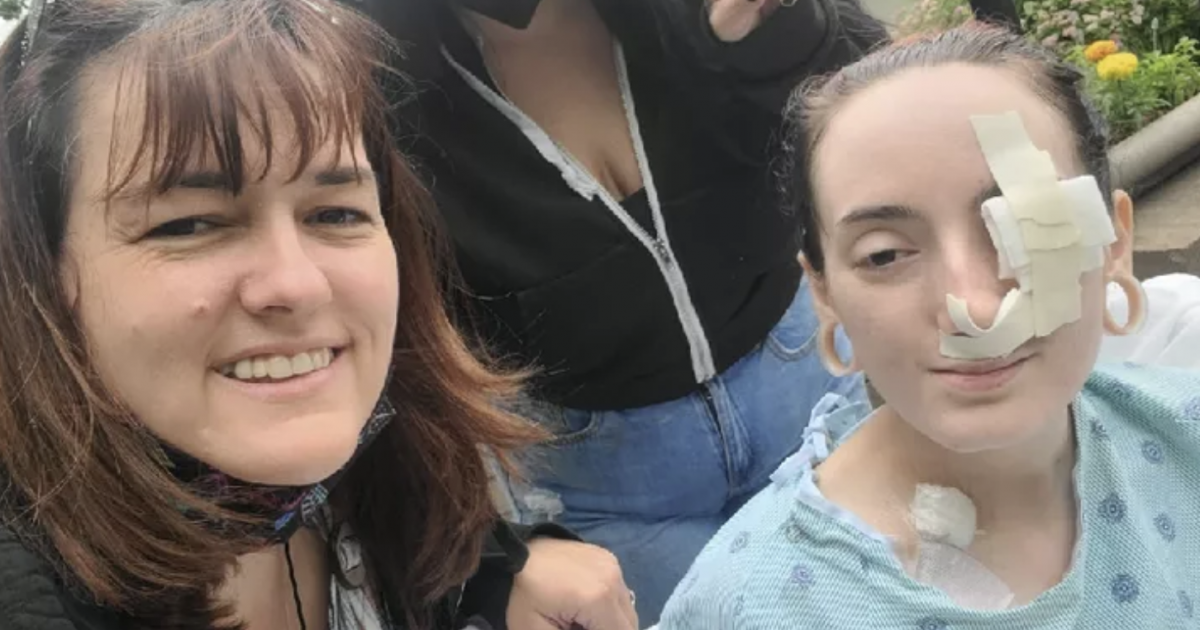Learning About Sinus Cancer
- Marlena Ciambrone, 28, always had issues with her sinuses. But when she started getting constant nosebleeds a few months ago, she knew she had to investigate. After that, she was diagnosed with a rare and aggressive form of sinus cancer, and today she’s in a fight for her life.
- Nasal cavity and sinus cancers are rare, and symptoms don't usually show up at earlier stages of the disease. Sometimes these cancers are discovered during treatment for a sinus infection.
- Being your own advocate can be key to coming to a correct cancer diagnosis and obtaining the best treatment possible while dealing with a diagnosis.
Marlena, 28, of Two Rivers, Wisconsin, had struggled with sinus issues for a long time. But things took a serious turn for the worse when she started getting constant nosebleeds three months ago.
Read More“There’s a real risk that we could lose her because it’s so aggressive,” Sheila said.
RELATED: An Illinois Man Thought He Had A Tooth Infection, It Turned Out To Be Sinus Cancer
Right now, Marlena is struggling with weight loss, and she has medications and a nerve block for the extreme pain she’s experiencing. She’s also lost her sense of taste and sense as well as her vision in her left eye, and now she’s struggling to see with her right eye.
“She loves to paint, and draw, and sketch, and right now to see that she’s potentially going fully blind is heartbreaking,” Sheila said.
She’s underway with her three months of chemotherapy treatments, and doctors are currently trying to decide if they should start radiation sooner than anticipated. Marlena’s mother and sister have relocated to Wisconsin from south Florida to be with her as she receives treatment, and now Sheila is asking for help through a GoFundMe fundraising page.
“I know times are hard for everyone and those who know me know I don’t like asking but at this time I have to ask for & accept help because I need to help my little girl to fight like hell right now,” the GoFundMe page reads. “Thank you to everyone in advance and please add Marlena to your prayers she will need all she can get.”
Understanding Nasal Cavity and Sinus Cancers
Nasal cavity and sinus cancers are rare. Memorial Sloan Kettering Cancer Center reports that these cancers only affect about 2,000 people in the United States each year, and tumors are more likely to begin in the nasal cavity than in the sinuses. We don't know exactly what type of sinus cancer Kelle had, but tumors tend to form in the maxillary sinuses when they do develop in the sinuses.
Tobacco use is a risk factor for nasal cavity and sinus cancers. And these rare cancers are more common in people who have had significant exposure to wood dust, nickel and chemicals used in leather processing.
It's uncommon for nasal cavity and sinus tumors to cause symptoms at their earliest stages. Unfortunately, most people tend to notice symptoms only once the tumor has grown large enough to block the nasal cavity or the affected sinus, or when it has spread to nearby tissue. That's why your doctor may discover the tumor during treatment for a sinus infection.
Common signs of nasal cavity cancer and sinus cancer include:
- nasal congestion that doesn't go away
- chronic sinus infections that don't respond to antibiotics
- frequent headaches
- facial pain
- nosebleeds
- swelling around the eyes
- decreased sense of smell
More advanced disease is associated with:
- loose teeth
- numbness around the cheek and upper lip
- double vision
- swelling in the mouth, jaw or neck
Advocating for Your Health
As we've seen in the case of Marlena Ciambrone, it's always important to pay attention to the changes happening to your body and make sure that medical professionals investigate.
You have every right to insist that your doctors investigate any possible signs of cancer, other avenues for treatment or the potential of a different diagnosis. And even if you simply don't know what's causing a change to your body, you should still seek professional help. You never know when speaking up about a seemingly unimportant issue can lead to a very important diagnosis cancer or otherwise.
Be Pushy, Be Your Own Advocate… Don't Settle
"Every appointment you leave as a patient, there should be a plan for what the doc is going to do for you, and if that doesn't work, what the next plan is," Dr. Zuri Murrell, director of the Cedars-Sinai Colorectal Cancer Center, told SurvivorNet in a previous interview. "And I think that that's totally fair. And me as a health professional that's what I do for all of my patients."
In a previous interview with SurvivorNet, April Knowles explained how she became a breast cancer advocate after her doctor dismissed the lump in her breast as a side effect of her menstrual period. Unfortunately, that dismissal was a mistake. Knowles was diagnosed with metastatic breast cancer at age 39. She said the experience taught her the importance of listening to her body and speaking up when something doesn't feel right.
I Wanted My Doctor To Like Me, Then He Missed My Breast Cancer
"I wanted my doctor to like me," she said. "I think women, especially young women, are really used to being dismissed by their doctors."
Figuring out whether or not you actually have cancer based on possible symptoms is critical because early detection may help with treatment and outcomes. Seeking multiple opinions is one way to ensure you're getting the care and attention you need.
Another thing to remember is that not all doctors are in agreement. Recommendations for further testing or treatment options can vary, and sometimes it's essential to talk with multiple medical professionals.
Learn more about SurvivorNet's rigorous medical review process.

